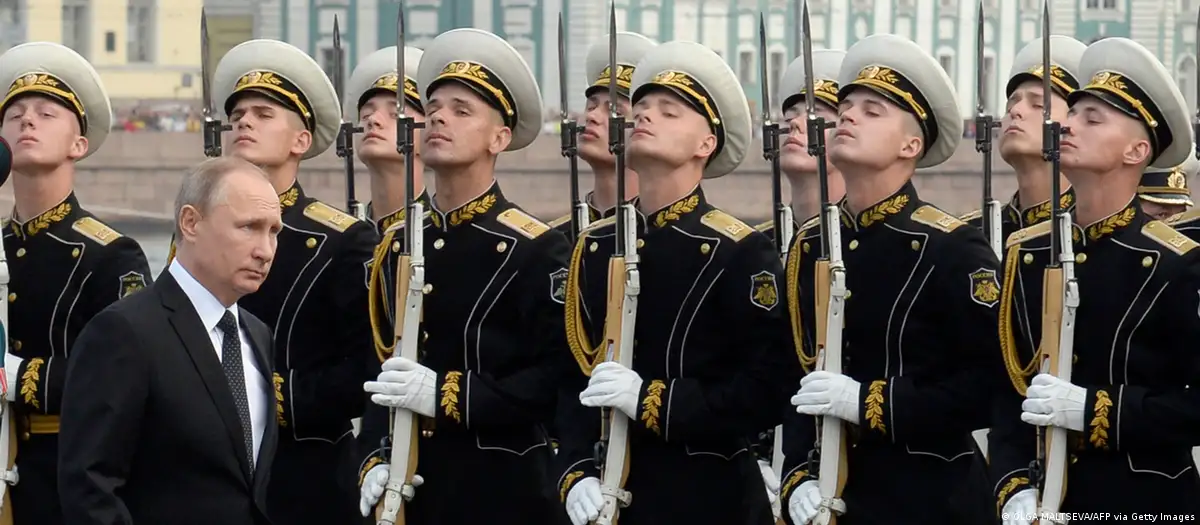With the Kremlin’s approval, Russia’s domestic intelligence service has already arrested five high-ranking members of the Defense Ministry, strengthening itself in an internal dispute over power and the war budget.
(DW) Part of the biggest overhaul of the military leadership under President Vladimir Putin since the invasion of Ukraine in 2022, the recent arrest of five senior Russian Defense Ministry officials in the wake of investigations by the Federal Security Service (FSB) has been interpreted as a sign of a falling out between the intelligence agency and the military, at a time of dispute over the sector’s budget and the identification of those responsible for failures in the conduct of the war.
The purge of military personnel accused of corruption was promoted under the blessing of the Kremlin, and is seen as a triumph for the FSB, successor to the Soviet KGB, in winning the favor of President Vladimir Putin – himself a former KGB agent. It also comes at a time of a record defense budget, 6.7% of Russia’s GDP, according to the government itself – something not seen since the Soviet era.
The raid on the Defense Ministry began on April 23, with the unexpected arrest of the ministry’s deputy minister, Timur Ivanov, on suspicion of bribery. Ivanov, a political godson of then minister Sergei Shoigu, had held the post since 2016 and was responsible for major military construction projects, such as the reconstruction of Mariupol, a Ukrainian city devastated by war.
Ivanov’s arrest was, so far, the most prominent in the ministry’s hierarchy, and is believed to have prepared the ground for Shoigu’s ouster and the subsequent FSB crackdown – and this despite the fact that corruption in the upper echelons of the Armed Forces is nothing new even to Kremlin officials and has even been pointed out by pro-war bloggers.
Shoigu was removed from office three weeks after Ivanov’s arrest, after almost 12 years of service. He took over as head of the Russian Security Council after Putin was reappointed for a fifth term.
In his place came economist Andrei Belousov, charged with reducing corruption in the ministry and optimizing the industrial war production line.
Following the announcement of the change of command at the Ministry of Defense, three other arrests were made, also on suspicion of receiving bribes: lieutenant general Yuri Kuznetsov, head of the ministry’s personnel department; Vadim Shamarin, head of staff communications; and Vladimir Verteletsky, who ran a division in the procurement department.
In addition to them, a general critical of the ministry’s command, Ivan Popov, was arrested last week on charges of embezzling more than 130 million rubles (R$7.5 million) in materials bought by the ministry. He had been dismissed from the service in 2023 because, he claimed, he had complained about the lack of weapons and supplies in the war.
Dissatisfaction with the ministry’s leadership had also led mercenary Yevgeny Prigozhin, leader of the Wagner Group, to organize a mutiny in 2023 to demand Shoigu’s resignation.
The arrests in a short space of time were described by The Moscow Times as the start of a clean sweep by the FSB. The Kremlin, however, denies that there is a raid on the bureau. According to Russian government spokesman Dmitry Peskov, the fight against corruption “is not a campaign, it is constant work”.

Corruption as an instrument of control and loyalty
Experts who monitor the situation in Russia say that corruption in the country is both a way of encouraging loyalty and a means of control. As security expert Mark Galeotti explains in one of the episodes of his podcast “In Moscow’s Shadows”, the fact that the state has compromising material against high-ranking officials is a trump card that allows it to handpick who to eventually act against. And with the war in Ukraine boosting defense spending, the opportunities for corruption have also expanded.
“Under Sergei Shoigu, the Defense Ministry became heavily influenced by his personal network,” Gleb Irisov, a former Russian air force lieutenant who left the institution in 2020, told the British newspaper The Guardian. “From senior commanders to lower-ranking officials, key positions were filled by Shoigu’s choices – friends or friends of friends.”
Irisov says he often found poor quality equipment in the Armed Forces, including light bulbs used in fighter jets that melted at supersonic speeds and air defense systems incapable of shooting down modern drones – shortcomings that he partly attributes to corruption in Shoigu’s management.
Director for democratic resilience at the Center for European Policy Analysis, Sam Greene said in an interview with the AP news agency that he thought it unlikely that the arrests would continue or spread beyond Defense, as this could lead to a stampede of generals and a wave of accusations, something that the Kremlin, faced with war, wants to avoid.

ra (AP, ots) *** Translated by DEFCONPress FYI team ***
